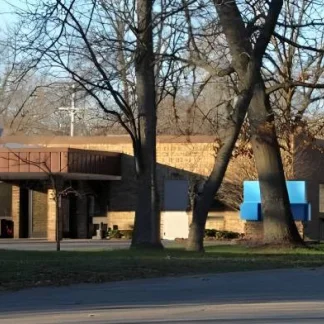Victory Clinical Services
Victory Clinical Services is a private rehab located in Kalamazoo, Michigan. Vic...
KPEP–Chicago Avenue is a residential drug and alcohol rehab for justice-involved adults in Kalamazoo, Michigan. They provide an alternative to incarceration for offenders in addiction recovery, specializing in supportive housing, psychotherapy, and recovery-focused life skills training to prevent relapse and recidivism. Dedicated services are available for young adults and persons with co-occurring addiction and mental illness.
KPEP–Chicago Avenue, in Kalamazoo, Michigan, is a residential addiction treatment center for adults on probation, parole, or work release. They specialize in supportive housing, intensive inpatient treatment, and aftercare planning and support, including dedicated programming for young adults and persons with co-occurring addiction and mental illness.
Residential Program The residential program offers a recovery-focused alternative to incarceration, allowing clients to cultivate their sobriety in a highly structured and supportive environment. Clients receive medical and mental health assessments, personalized care planning, and comprehensive case management. They also engage in intensive, CBT-based individual, group, and family counseling. The program promotes clients’ successful reintegration into the home, workplace, and community through robust life skills training, addressing topics such as coping, self-care, wellness, emotional regulation, decision-making, anger and stress management, job readiness, household management, budgeting, and relapse prevention.
Aftercare Services Their aftercare services ensure a complete continuum of care aligned with clients’ evolving needs. Their services may include transitional support for clients stepping down into outpatient treatment and/or exiting the criminal justice system, peer coaching, 12 step program facilitation, and referrals for medical, mental health, and social service programs.
Accreditation and Payment KPEP–Chicago Avenue is state licensed and accredited by CARF. They accept self-pay and sliding scale payment schedules.
Contact us for more information: (269) 382-4091

Connect with KPEP - Chicago Avenue by calling their admissions team directly.
(269) 382-4091 Website Get DirectionsThe Commission on Accreditation of Rehabilitation Facilities (CARF) is a non-profit organization that specifically accredits rehab organizations. Founded in 1966, CARF's, mission is to help service providers like rehab facilities maintain high standards of care.
CARF Accreditation: Yes
Cognitive Behavioral Therapy (CBT) is a therapy modality that focuses on the relationship between one's thoughts, feelings, and behaviors. It is used to establish and allow for healthy responses to thoughts and feelings (instead of unhealthy responses, like using drugs or alcohol). CBT has been proven effective for recovering addicts of all kinds, and is used to strengthen a patient's own self-awareness and ability to self-regulate. CBT allows individuals to monitor their own emotional state, become more adept at communicating with others, and manage stress without needing to engage in substance abuse.
Group therapy is any therapeutic work that happens in a group (not one-on-one). There are a number of different group therapy modalities, including support groups, experiential therapy, psycho-education, and more. Group therapy involves treatment as well as processing interaction between group members.
In individual therapy, a patient meets one-on-one with a trained psychologist or counselor. Therapy is a pivotal part of effective substance abuse treatment, as it often covers root causes of addiction, including challenges faced by the patient in their social, family, and work/school life.
Life skills trainings involve all the skills a person must have in order to function successfully in the world. These include time management, career guidance, money management, and effective communication. Truly successful addiction recovery is based on the ability to not only live substance-free, but to thrive. Life skills teaches the practical necessities of functioning in society, which sets clients up for success in life, and therefore sobriety.
Group therapy is any therapeutic work that happens in a group (not one-on-one). There are a number of different group therapy modalities, including support groups, experiential therapy, psycho-education, and more. Group therapy involves treatment as well as processing interaction between group members.
In individual therapy, a patient meets one-on-one with a trained psychologist or counselor. Therapy is a pivotal part of effective substance abuse treatment, as it often covers root causes of addiction, including challenges faced by the patient in their social, family, and work/school life.
Life skills trainings involve all the skills a person must have in order to function successfully in the world. These include time management, career guidance, money management, and effective communication. Truly successful addiction recovery is based on the ability to not only live substance-free, but to thrive. Life skills teaches the practical necessities of functioning in society, which sets clients up for success in life, and therefore sobriety.
In individual therapy, a patient meets one-on-one with a trained psychologist or counselor. Therapy is a pivotal part of effective substance abuse treatment, as it often covers root causes of addiction, including challenges faced by the patient in their social, family, and work/school life.
Life skills trainings involve all the skills a person must have in order to function successfully in the world. These include time management, career guidance, money management, and effective communication. Truly successful addiction recovery is based on the ability to not only live substance-free, but to thrive. Life skills teaches the practical necessities of functioning in society, which sets clients up for success in life, and therefore sobriety.
Life skills trainings involve all the skills a person must have in order to function successfully in the world. These include time management, career guidance, money management, and effective communication. Truly successful addiction recovery is based on the ability to not only live substance-free, but to thrive. Life skills teaches the practical necessities of functioning in society, which sets clients up for success in life, and therefore sobriety.
Victory Clinical Services is a private rehab located in Kalamazoo, Michigan. Vic...
Western Michigan University - Behavioral Health is an accredited outpatient trea...
Alano Club is a non-profit rehab located in Kalamazoo, Michigan. Alano Club spec...
EAP Consultants is a private rehab located in Kalamazoo, Michigan. EAP Consultan...